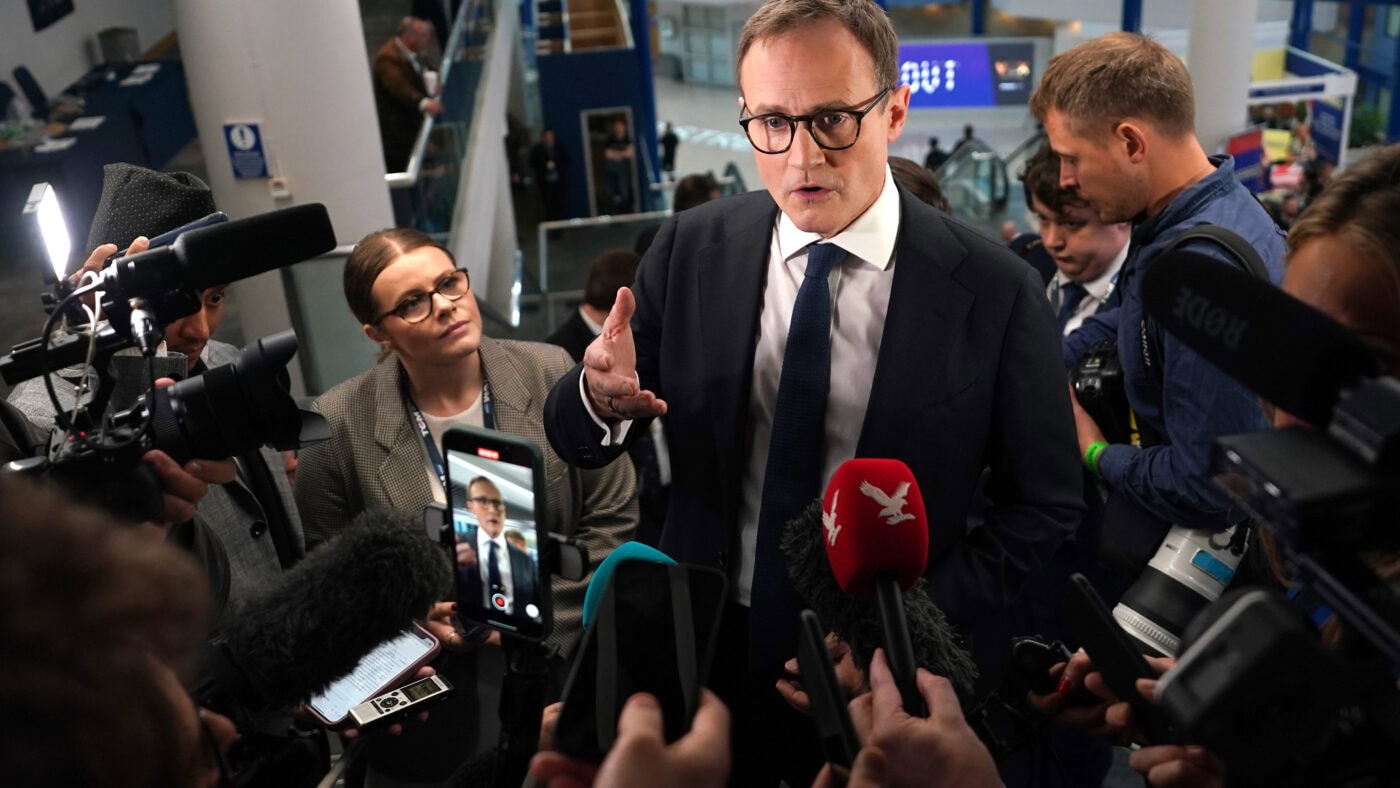As commentators debate who won the Conservative Party Conference’s final leadership hustings today, there’s no doubt of one thing. Tom Tugendhat’s campaign won the battle of the conference merch. The unlikely combination of Tugend-tats and Tugend-tan – temporary tattoos and bottles of fake tan – quickly became must-have items for those who treasure Tory campaign ephemera.
Whether Tugendhat’s leadership bid will leave a more lasting impression on the party remains to be seen. With the crunch vote to whittle the candidates down to the final two still ahead, he came for an interview with CPS Director and CapX Editor-in-Chief Robert Colvile yesterday, at which he set out his stall in more detail – and also mentioned his military service once or twice.
If there is one word that appears to define ‘Tugendhatism’, it is ‘trust’. He is, he says, determined to restore trust, not just in the Conservative Party, but in politics more generally. At the same time, he evidently doesn’t want us to trust the state too much. He also believes in trusting people to make decisions for themselves (including his team, who he gave the latitude to dream up his own-brand tattoos), which makes him a traditional low-tax, low-regulation Conservative. He is for cutting taxes that hold back growth and opportunity – and opposed the rise in National Insurance contributions.
When it comes to combining that with tackling the dire state of the public finances, his approach was a little less clear. The answer, he suggested, lies in reforming public services to deliver more for less. He cited education as a good example of how the Tories had used, yes, trust – in parents and teachers – to make a difference.
Still, growth is also clearly high on his agenda. That comes with a refreshing willingness to defend capitalism, something CapX readers will appreciate. As he put it, capitalism isn’t greed, but freedom. Freedom to do what you want with your assets and time and energy, within the rule of law – and then to also do what you want with any profits.
He set this liberating commitment to the rule of law in sharp contrast to the legalism of Keir Starmer, which, he suggested, offers instead the constraining rule of lawyers, shutting down innovation and opportunity.
That is, he was clear to say, not the ‘devil-take-the-hindmost’ position that it is sometimes caricatured to be. Conservatism, in Tugendhat’s eyes, connects the freedom of opportunity with the responsibility of community.
This theme of connections kept coming up. It was clear not just in his repeated expressions of commitment to the Union but even in the way he framed the need for more infrastructure. To Tugendhat, Beeching was wrong and we need more railways, because we all need to be more connected as a country. Urban densification matters not just because of the economic benefits, but because it allows people the options and opportunities that come with living in a place with more people. Labour are talking ‘absolute cobblers’ when they propose bulldozing fields rather than building homes in cities where they are wanted. A cynic might say that is also a more politically palatable option to push for a Conservative Party that fears the wrath of rural Nimbys.
Tugendhat evidently takes this campaign seriously, and claims to be the only candidate offering the leadership necessary to deliver a Conservative revolution (a slogan he shares with the title of a recent Centre for Policy Studies book). He was not above a sharp rebuke to Robert Jenrick for what he calls irresponsible and serious allegations about our special forces, which he said were simply wrong. He had strong words too for what he says is the shocking misogyny of Westminster: far worse, he claims, than anything he saw having served in all-male units.
Above all, his message is patriotic optimism. The Conservative Party can be restored, and with a belief in Britain and a commitment to freedom and opportunity, we can build a better future for everyone. He calls Keir Starmer a ‘dealer in despair’.
Still, hope will not be enough. Tugendhat is seen as relatively untried in office, despite having served as Minister for Security (and – did we mention? – in the British Army). For all his evident decency and integrity, with the Party still recovering from a electoral wipeout, the question is whether members will trust him to deliver.
Click here to subscribe to our daily briefing – the best pieces from CapX and across the web.
CapX depends on the generosity of its readers. If you value what we do, please consider making a donation.


